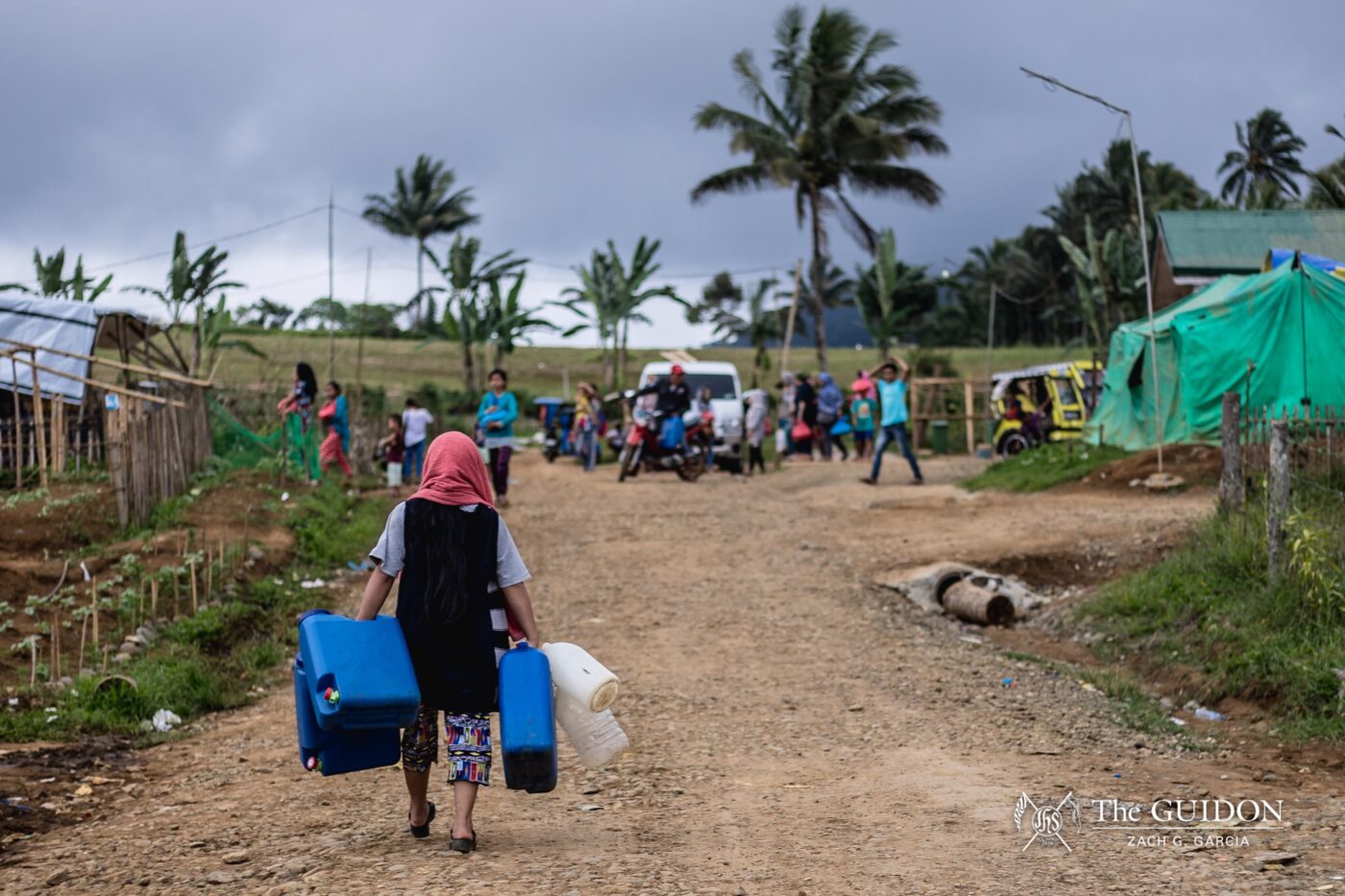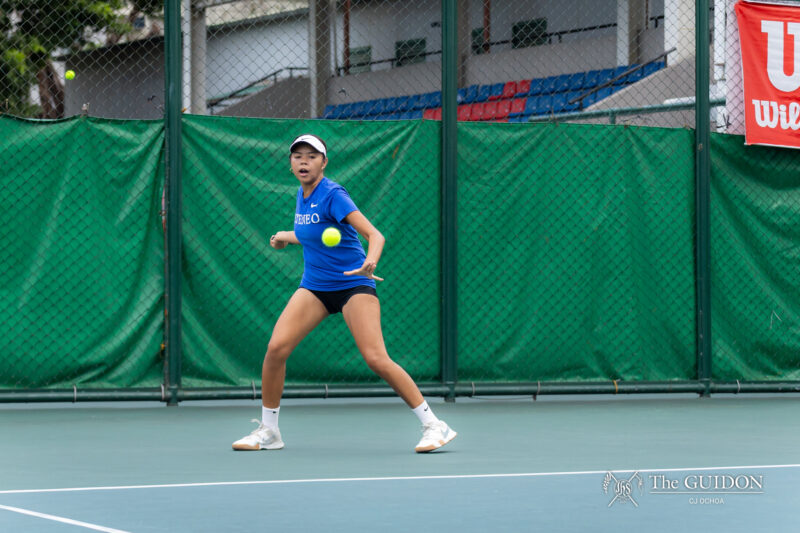ALIASA PUMBAYA has lived in Marawi City for the majority of his life. A resident of Barangay Raya Madaya II, a barangay deep into the Most Affected Area (MAA), his business was in the retail trade, selling ready-to-wear clothes in Manila. But when terrorists laid siege to the city on May 23, 2017, Pumbaya’s way of life was gone.
The destruction of the Islamic City forced Pumbaya, as well as several other Internally Displaced Persons (IDP), to seek other ways of earning a living. Government estimates put the rehabilitation effort of the Marawi MAA to last for about three to five years, which puts a dent on the chances of people like Pumbaya to return to their old way of life anytime soon.
Pumbaya currently lives in Barangay Bito Buadi Itowa, one of the adopted communities of Xavier University (XU) – Ateneo de Cagayan, and one of the larger IDP camps on the outskirts of Marawi. With the guidance and support of XU Tabang Marawi, the university’s volunteer movement for Marawi, the barangay is ground zero for efforts to introduce farming as a viable livelihood for the IDPs.
The project adapts the agroenterprise technology of the Jollibee Foundation and XU’s earlier initiative in Farmer Alliances for Resource-strengthening and Marketing (FARM) by making use of a “clustering approach.”
Starting in August 2017, the barangay was grouped into clusters, to be overseen by ten cluster leaders, including Pumbaya. These cluster leaders were brought to XU’s campus in Cagayan de Oro and were personally instructed in vegetable farming by faculty members of the university’s College of Agriculture.
The cluster leaders then transmit their knowledge to the rest of their respective clusters in order to cultivate the one-hectare barangay. The hope is for each family to have a stable source of income during the long wait as the MAA undergoes rehabilitation. XU hopes to roll out the project in at least seven contiguous barangays in Marawi City.
Urban hands, rural work
However, reception to the initiative by Barangay Bito has been lukewarm. Pumbaya says that only a portion of the community has taken up agriculture work enthusiastically. As a result, Pumbaya and his brothers were forced to take up the unused plots for cultivation themselves.
“Malalagyan na ng mga damo. Ta’s sabi ko sa sarili ko ay kunin ko na lang ‘yun kasi sayang din naman,” he says.
(The plots would have been overgrown with weeds. I told myself to just take on the additional land because it would have been wasted otherwise.)
Monitoring inspections by Tabang Marawi volunteers seem to spur the residents into tending to their crops, but for the most part, farming does not seem to be an appealing way of life for the Maranaos of Barangay Bito.
The problem might partly have to do with the shifting demographics of the area. While Lanao del Sur remains an overwhelmingly agricultural province, more people are eschewing the farms for urban living. From 18,663 in 2007, the urban population almost doubled to 38,791 in 2010, according to the latest available census.
The adoption of farming as a form of livelihood bucks a years-long trend away from agriculture and towards urban work. However, the lack of other opportunities as a result of the siege might serve to arrest the trend, and bring Maranao farmers back to the fields of Lanao del Sur.
Aside from this, some have also grown discouraged by the meager earnings from the project. Since Barangay Bito is an adopted community of XU, Pumbaya and the rest of the would-be farming community do not receive assistance from the Department of Agriculture (DA). Pumbaya himself recounted how other barangays directly assisted by the DA receive upwards of P2,000 monthly for cultivating lands smaller than their own. Comparatively, Pumbaya says he earns about P700 per month for his produce.
“Kawawa naman kami talagang mga mag-aani kasi wala kaming natatanggap na kahit kaunting kusing na galing sa gobyerno na dapat naman iyan ay para sa amin talaga,” Pumbaya says.
(We till the land but we don’t receive any money from the government even though we deserve it.)
Making the land work
Yet, even for farmers like Pumbaya who put in hard work, earning from the agroenterprise initiative remains an uphill battle. Vegetables planted in their gardens are frequently a hit-or-miss, as farmers have had to contend with the suitability of the land itself for agricultural activity.
According to Pumbaya, the vegetable seedlings are chosen and given to them free of charge by XU. The seedlings were taken from XU’s partner institutions, especially Gawad Kalinga (GK). The crops that would be harvested from the seedlings donated by GK would be used to supply its feeding programs such as potato, sayote (chayote), pole sitao, mungbean, pechay (chinese cabbage), squash, white beans, cabbage, carrots.
During the initial phase of the project, the seedlings underwent a trial-and-error process to see which plants would be suitable for farming in the area. Some of the first seedlings, which included okra and pechay, were not able to prosper in Barangay Bito. After some experimentation, the farmers soon found that carrots and radishes grow better in those conditions, and started planting them more frequently.
According to XU Agriculture Sciences Department Chair Judith Tandan-Pit, a lot of work is needed to be done to improve the soil fertility in Barangay Bito, as the soil was “not in good condition as far as [crop] growth is concerned.”
Farmers were introduced to vermicomposting, an organic method to enhance soil fertility. Vermicompost uses worm species to decompose organic material to be used as fertilizer for the soil. XU provided vermicompost to the farmers, but also taught them the process for creating it on their own.
“By vermicomposting, individual farmers will not only benefit [from] the cast and compost as source of organic fertilizer in their garden, but also [from] the earthworm itself. They can sell the cast for P400–500 a kilo, vermicompost P200–250 per sack and the worm itself is P400–500 per kilo as additional income,” Tandan-Pit says.
But Pumbaya also points to another problem: Irrigation. A scarcity of water prevents crops from growing efficiently and properly, leaving farmers having to improvise for their produce. Pumbaya says that the farmers have resorted to using the water supplied by groups such as the Red Cross for their vegetables, but this has proven unusable as the crops die soon after the water is used.
Tandan-Pit has suggested mulching, the application of a layer of material on the surface of the soil, as a way to counter the problem of water sourcing, as well as to reduce the presence of weeds. The process will maintain moisture in the soil and reduce extant water demand.
She hopes that by presenting these methods to the community through a demo farm for them to observe, the farmers will be encouraged to pursue this way of living. “This [agroenterprise initiative] is viable when there is a demo farm in the particular area since [for the] farmer, to see is to believe,” she says.
The market decides
But a seller alone does not a market make. Even as the farmers try to ramp up production, the bigger question is in finding suitable buyers. The program will need to integrate Barangay Bito’s operation within the larger supply chain in order for it to be viable source of income for the IDPs. The farmers sell 80–90% of their crops, and leave the rest for their own consumption.
Institutionally, the farmers are assured of a buyer, as GK has promised to purchase Barangay Bito’s produce through XU for its feeding programs. Jollibee Foods Corporation has also expressed willingness to purchase crops from Barangay Bito.
But outside of this, the farmers themselves have a hard time selling their crops in local markets as they find their produce rejected by Maranao appetites. Pumbaya says that there are certain crops that are not popular with Muslims, and are sold cheaply. According to Pumbaya, radishes cost about P7 per kilo when sold in the market in nearby Saguiaran. Okras are more expensive, costing about P40 per kilo, but still are unpopular with Muslims. He says that the agroenterprise program could earn more if they could establish a permanent presence in the market.
“Kung ako ang tatanungin, parang malaking opportunity kung may taong tumulong sa amin. Lalo na sa akin. Tutulungan ako ng tao na magkakaroon ng business, something, pwesto lang. Kahit maliit lang na alam ko naman pwede kong lagyan ng mga paninda na makapagpabuhay sa aming pamilya, e ‘di masayang masaya,” Pumbaya says.
(If you ask me, it would be a good opportunity if there could be someone to help establish a store in the market in order to sell our crops. Even just a small place so I could display my goods and provide for my family will make me happy.)
For now, XU has constructed a bagsakan or stock area to place their crops at the side of the road. For XU and their partner institutions, they hope that the project will eventually develop into a sustainable way of life for the IDP community of Barangay Bito.
“[The] hope [is] that if XU will move out from the area, the farmer and the program will continue in order to minimize if not eliminate hunger in the community,” says Tandan-Pit.
But for Pumbaya, things are less optimistic. “Sa tingin ko, makakaya ko naman kasi wala naman tayo magawa… Ang importante naghanap ka ng kabuhayan at saka binubuhay mo sa pamilya mo,” he says.
(I think that we can make do with the project because we have no other choice. What is important is that we look for ways to sustain our families.)




